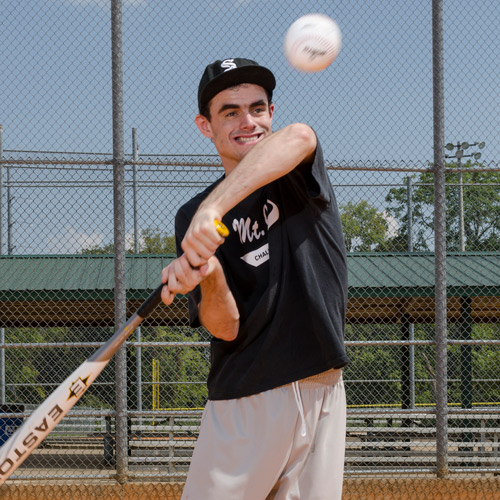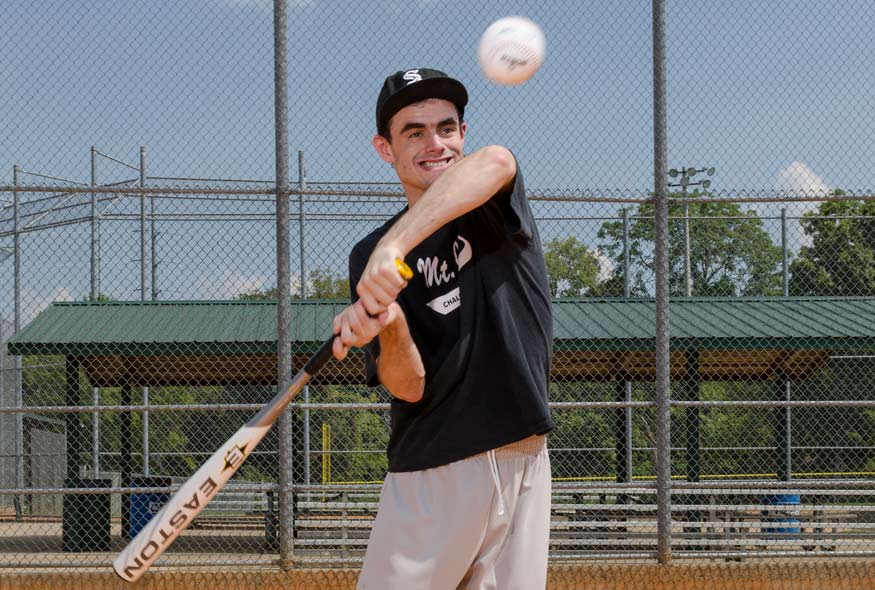
For love of the game
Published on March 9, 2017
Erik’s fingers tighten on the bat as he tracks the pitch and swings. He’s a little off balance and his head is out of position and his hands are ahead of his body, but he swings with purpose and conviction and the barrel of the bat finds the center of the ball. He strokes a hard line drive into the gap in right-center; and the tingle that runs up his arms tells Erik he’s hit the ball solid even before his head looks up to find it.
Erik drops the bat and starts running, digging hard for first. In that moment, he’s a little kid again, racing the wind to first base. And all things are possible.
Erik is a client at RHD Nashville. He has autism and developmental disabilities with several challenging behaviors. Before coming to RHD, he was often prone to serious self-injury. But since arriving at his own home in a Nashville suburb specifically created for him by RHD’s Environmental Design team, Erik’s behavior has undergone a huge transformation. He eats dinners with his family and goes on trips in the community. Erik loves cars — his house features representations of racecars and Corvettes in most of the rooms — and last year he got a chance to wave the starting flag at a local race.
Still one of the things he talked about was baseball.
“Baseball was one of the things that he just loved to do,” said Jordan Allen, former RHD Nashville director. “He played in Little League when he was younger, and he missed it. And now he’s connecting with a time in his life when things weren’t so tumultuous. That’s very comforting.
“What he wants, and what he’s achieving, is to regain a sense of a productive life. Erik remembers his childhood, where he lived at home and had dinner with his family and played baseball. And that’s juxtaposed in his head with how it is now. That’s hard, sometimes, because he struggles to gain the skills he needs to recapture some parts of life before the onset of his issues. So we do everything we can to support him so that he feels like he’s back in control of his life again.”
RHD project manager Ifeanyi McClain found a league that is available specifically for athletes with physical, mental or behavioral challenges. Practicing in the yard behind Erik’s house, the staff was confident that he could physically handle playing. He’s strong and fast, and he can run, catch and throw.
“We knew there would be some challenges,” McClain said. “Erik, when he first came to us, would occasionally exhibit self-injurious behavior. And we were talking about putting a bat in his hands. But he wanted it so much that, as a staff, all we talked about was how we could make it work.”
A key element of Erik’s progression was his ability to alert his staff and describe how he was feeling — good or bad.

“When Erik gained the awareness and the ability to tell us when he was beginning to de-compensate, when he was starting to feel aggressive, that opened up a lot for him,” Allen said.
For Erik’s first game, several RHD staffers arrived to support him, with safety equipment in tow. But they found that the sheer joy of playing, of regaining that piece of his life, so buoyed Erik that most of it was unnecessary.
“He puts that uniform on and he just lights up,” McClain said. “He tracks on the calendar when the games are, and he really looks forward to game day. He’s so happy that he gets to play. One of the things we worried about is that Erik doesn’t always like to wait his turn; he kind of wants things when he wants them. And baseball involves a lot of waiting; you’re waiting for your spot in the order, you’re waiting for your team’s turn to hit. And he’s great — he knows when he’s due up, and he just waits for his spot while other people hit. He knows the game.”
Erik arrives early to the game, wearing as always his White Sox cap (“I like the White Sox!” he said). He’s playing for the Mt. Juliet Challengers, and wears number 16.
“I like being on the field,” Erik says, beaming. “I like playing; I can do it. I like to hit.”
Asked if he hits for power or average, Erik says: “Power!” McClain, who works closest with Erik and attends many of the games, adds that Erik likes it best when he hits the ball and sees it go a long way, and Erik smiles and says: “Yeeeeeeaah!”
“Erik feels like he’s had a lot of things stripped away from him because of his illness, and one of them was playing baseball, which he loved,” said Erik’s father, Russ. “RHD was a big part of him being able to play again, and it makes him happy. He’s doing something that makes him feel good, and confident, and he feels like it’s given him back a big part of his life.
“For his mom, Sara, and me, the highlight of our week is seeing Erik play again, and doing something that makes him feel accepted and happy. For us, that’s it.”
Erik’s line drive finds the gap and keeps rolling. He’s running hard now, head down, rounding second — and then his head pops up, a big smile on his face as he approaches third. The third base coach is waving him in, but it’s not clear if Erik even sees him; he cuts the bag hard with his left foot and heads for home. His last stride reaches out and stomps the plate hard. He’s hit a home run. Erik keeps running toward the dugout, easing up, and he approaches McClain. Erik reaches up and cracks McClain’s hand with a joyous high five. As he reaches the dugout Erik comes to stop and puts his hands on his hips. He smiles, and exhales.


